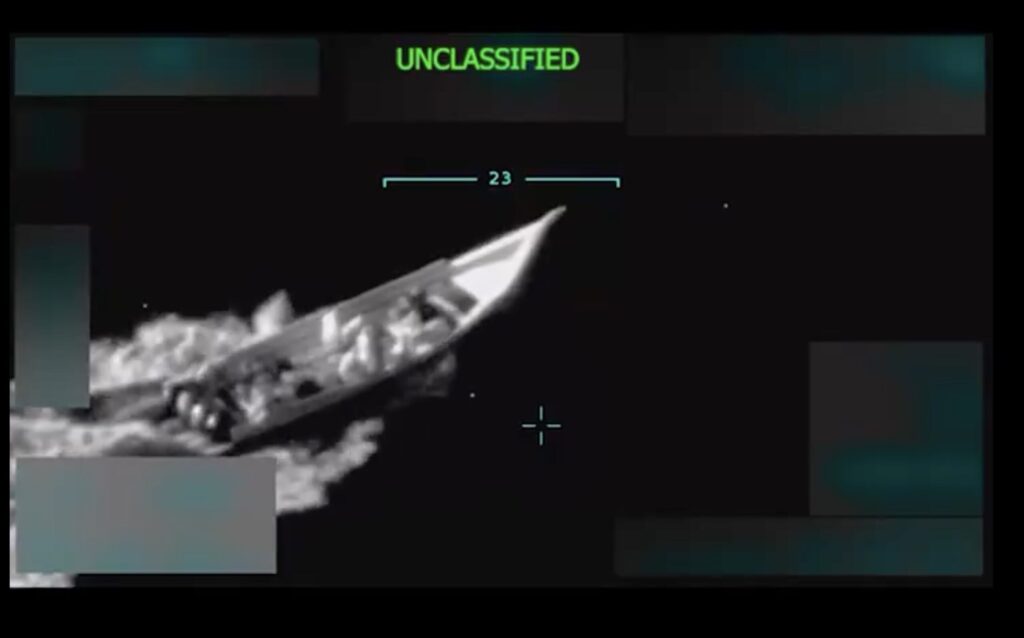
The U.S. military conducted a strike on a vessel in the Caribbean on September 4, 2025, resulting in the deaths of 11 individuals. This action, endorsed by President Donald Trump, was justified on the grounds that the ship was transporting illegal narcotics linked to the Tren de Aragua drug cartel, which Trump has labeled a terrorist organization. The legal ramifications of this military operation have sparked significant debate among experts.
Presidential Authority and Legal Framework
Under the U.S. Constitution, the authority to declare war resides with Congress, while the president serves as the commander-in-chief. Historically, presidents from both political parties have conducted military operations without congressional approval, often citing national interest. A memo from the Office of Legal Counsel indicates that military force may be justified in limited contexts when it does not reach the level of war and is not explicitly restricted by Congress.
The strike on the vessel marks a notable deviation from traditional military engagements. Typically, U.S. military actions target recognized enemy combatants or terrorist groups such as al Qaeda. In this instance, Trump claimed the vessel was engaged in drug trafficking, a situation that would typically fall under the jurisdiction of the U.S. Coast Guard. Legal experts suggest that if Coast Guard personnel had encountered resistance, they would have been justified in defending themselves.
The administration has not provided evidence that the U.S. faced an imminent threat, nor has it clarified whether the vessel was armed or if there were specific individuals on board involved in planning a terrorist attack. The Tren de Aragua cartel does not currently operate in a state of active war against the United States, leading many to categorize the casualties as civilians, raising concerns about extrajudicial killings.
Implications Under International Law
The Charter of the United Nations emphasizes the importance of refraining from force against other nations, while recognizing members’ rights to self-defense. The U.S. might argue that its action was a form of anticipatory self-defense, especially as Trump claimed the cartel was linked to Venezuelan President Nicolas Maduro. Yet, without clear evidence of an imminent threat or prior attacks, this justification may not hold under international law.
Venezuelan officials have contested the assertion that the Tren de Aragua cartel operates within their borders. The legality of self-defense in relation to non-state actors remains a contentious issue in international law, with legal experts divided on its applicability.
The U.S. administration has asserted that the vessel was in international waters. If it were flagged, this would imply the attack occurred in the territory of the flag state, marking a potential escalation in military engagement.
Future Legal Challenges and Political Ramifications
While the Venezuelan regime and the Tren de Aragua cartel are often viewed as international pariahs, this perception may not deter potential legal challenges. Critics within Congress have expressed disapproval of the attack, highlighting that lawmakers have sought to limit presidential military authority. Despite this, Congress has increasingly relinquished its war-making powers to the presidency over recent decades.
Any U.S. legal challenges regarding the strike’s authorization would likely face significant obstacles, as courts tend to defer to the president in matters of foreign relations and security. Families of the victims could pursue civil litigation for damages, although such cases may require extensive and costly legal proceedings.
The risk of killing an American citizen also looms large, given the precedent set during the Obama administration’s targeting of U.S.-born al Qaeda militant Anwar al-Awlaki. The legality of that operation was contested in U.S. courts and highlighted the complexities surrounding military action.
There is also the possibility of international legal scrutiny through bodies such as the Inter-American Court of Human Rights, although the United States is not a party to this court. While challenges may not yield immediate results, they could adversely affect U.S. relations globally and complicate future collaborations on issues such as drug trafficking and immigration.
The implications of this military strike extend beyond legal interpretations, potentially reshaping U.S. foreign policy and its approach to international law. As the situation unfolds, the balance between national security and compliance with legal standards remains a critical point of discussion among policymakers and legal experts alike.






